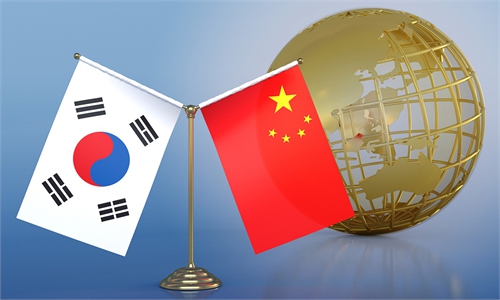
Illustration: Chen Xia/GT
Wednesday marks the 30th anniversary of the establishment of China-South Korea diplomatic relations. Over the past 30 years, the two countries have gone through an extraordinary journey including regional political turbulence after the end of the Cold War, the international financial crisis in 2008, and crises on the Korean Peninsula. Now, given the ongoing Russia-Ukraine conflict, the COVID-19 pandemic, regional turmoil and a sluggish global economy, the world has come to a complex and sensitive period.
Facing this backdrop, China and South Korea, as two important countries, should take the anniversary as an opportunity to further strengthen their communication and cooperation. It is of great significance not only for the two countries, but also for the peace and development of the region and the world.
Over the past 30 years, China and South Korea have improved ties simultaneously in the fields of politics, economy, culture and security. Politically, the two have established strategic partnership of cooperation as early as 2008. Economically, in 2021, bilateral trade exceeded $360 billion. Before the COVID-19 pandemic, the two countries' people-to-people exchanges reached 10 million visits per year. In terms of security, the two have held high-level security dialogues.
Few countries have such ties which have promoted cooperation across different fields at the same time. One key for the smooth development of the bilateral relationship has been mutual respect. China attaches great importance to its ties with South Korea. Even after the outbreak of the COVID-19 pandemic, Yang Jiechi, a member of the Political Bureau of the Communist Party of China (CPC) Central Committee and director of the Office of the Foreign Affairs Commission of the CPC Central Committee, and Chinese State Councilor and Foreign Minister Wang Yi have paid three visits to South Korea in total, making South Korea the most frequently visited country by Chinese high-level official during the pandemic.
On March 10, 2022, President Xi Jinping sent a congratulatory message to Yoon Suk-yeol on his election as President of South Korea. On March 25, the two held a phone conversation.
On May 9, Chinese Vice President Wang Qishan led a delegation to South Korea to attend the inauguration ceremony of Yoon, making Wang the highest-rank Chinese official to attend a South Korean president's inauguration and highlighting the continued high importance China attaches to the development of relations with South Korea.
Another key for the rapid development of bilateral relations is the need for each side to accommodate the core concerns of the other.
The two countries have different positions and face distinct pressing issues, making it normal for them to have respective considerations on related issues. During the 30 years since the establishment of diplomatic relations, there have been questions such as "Should Seoul follow the US in interfering in China's internal affairs such as Taiwan question?" and "What kind of relationship will China develop with North Korea?" Despite issue of THAAD deployment, both countries have generally taken consideration of each other's core concerns, which is the key to ensuring the healthy development and stability of bilateral ties.
On the 30th anniversary of establishment of diplomatic ties, China and South Korea need to revisit their original intentions on bilateral relations, especially the relevant provisions in the Joint Communique on the Establishment of Diplomatic Relations between the Republic of Korea (ROK) and the People's Republic of China (PRC), which clearly states that ROK recognizes PRC as "the sole legal government of China" and said it "respects the position of the Chinese side that there is but one China in the world, Taiwan is part of China," and stipulates that China respects the desire of the Korean people for quick reunification through peaceful means and supports their efforts to reach that goal. As long as the two sides properly deal with third-party factors such as the US in accordance with the principles of the communique, bilateral political relations can maintain a healthy development.
As the international status of both China and South Korea have risen, it's clear that the importance of the current bilateral ties has increased rather than declined, which has even long gone beyond simple bilateral relations, but has played a significant role in influencing the direction of regional and international issues. Looking ahead, both countries need to promote the stability and long-term future of the relationship and work together for the benefit of the people of both countries and the world, upholding the beneficial experience of the healthy and rapid development of bilateral relations.
The author is a research fellow of East Asian studies at the Chinese Academy of Social Sciences in Beijing. opinion@globaltimes.com.cn

